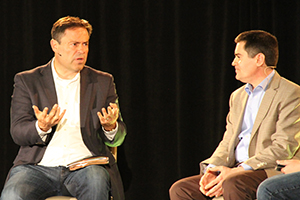The Ethics & Religious Liberty Commission (ERLC) co-hosted an event with 9Marks called “Connecting Church and Culture” that attracted more than 800 attendees at the 2015 Southern Baptist Convention annual meeting in Columbus, Ohio. The event included a panel discussion with ERLC President Russell Moore and Mark Dever, pastor of Capitol Hill Baptist Church in Washington D.C. It was moderated by Phillip Bethancourt, executive vice president of the ERLC and Jonathan Leeman, editorial director of 9Marks and elder at Capitol Hill.
The conversation covered a range of topics related to cultural engagement and local church ministry. The purpose of the event was to help churches consider “how the gospel applies to culture and applies to the church,” according to Bethancourt.
|
From left, Mark Dever and Russell Moore |
Bethancourt started the discussion by asking Moore to explain “how the collapse of the Bible-belt is bad for America but good for the church,” a topic addressed in Moore’s forthcoming book, Onward. Moore said “Bible-belt culture” provided social deterrents against undesirable practices because a person’s standing in a church often affected his or her standing in the community – like the stigma associated with divorce, for example.
He said blending church and social order creates nominal Christianity. “When you have the sort of Christianity,” continued Moore, “where in order to be part of the community, you have to be part of church, you lose the distinction between the church and the world.”
Moore added, “God has given us the opportunity to reclaim our distinctiveness and to reclaim our strangeness … it’s going to be difficult to be a good American and a Christian at the same time. I think that can be very good for the witness of the church.”
Leeman asked the panelists to discuss how to engage Christians who believe same-sex marriage is biblically acceptable. Both Moore and Dever agreed that pastors should treat these claims seriously. Dever said a “warning” tone was appropriate for younger believers that might be new to Christian theology and doctrine, but a firmer tone was necessary for older Christians making “high-handed” claims that same-sex marriage is biblically acceptable.
Moore said the issue is about “differing claims of apostolic authority,” because those arguments assume that “if the Apostle Paul had known what we [allegedly] know now about sexual orientation, he would have written differently about the issue.” He continued, “that is not just an interpretation of a moral text. That is a different understanding of the inspiration of scripture … It’s an issue of sufficiency of scripture.”
The panelists also took questions from the audience via Twitter, discussing whether or not to attend same-sex weddings, the long-term effects of the sexual revolution, how to use pronouns with transgender people and other topics.
Visit erlc.com and 9marks.org.
(EDITOR’S NOTE – Seth Brown is the content editor at the Biblical Recorder.)

